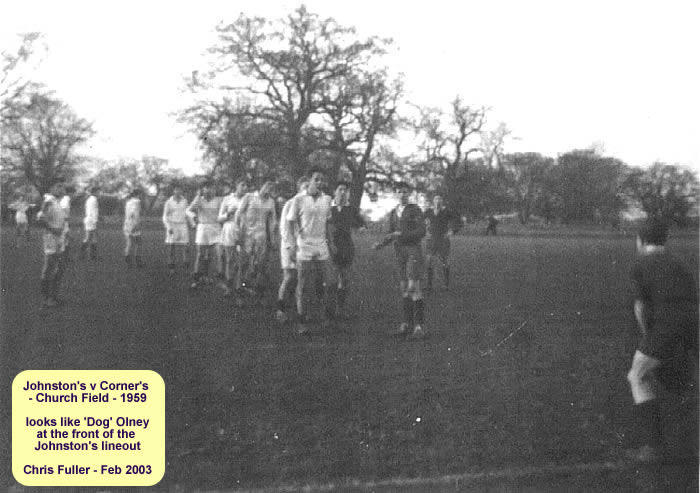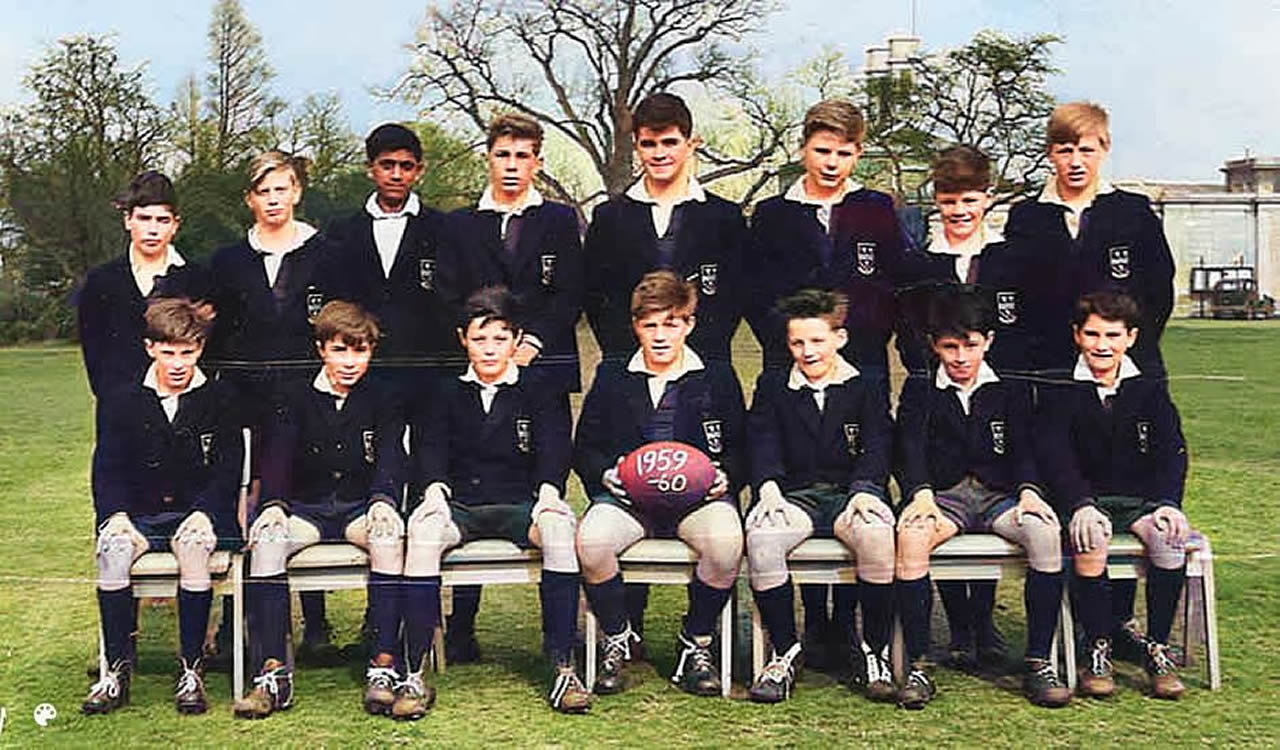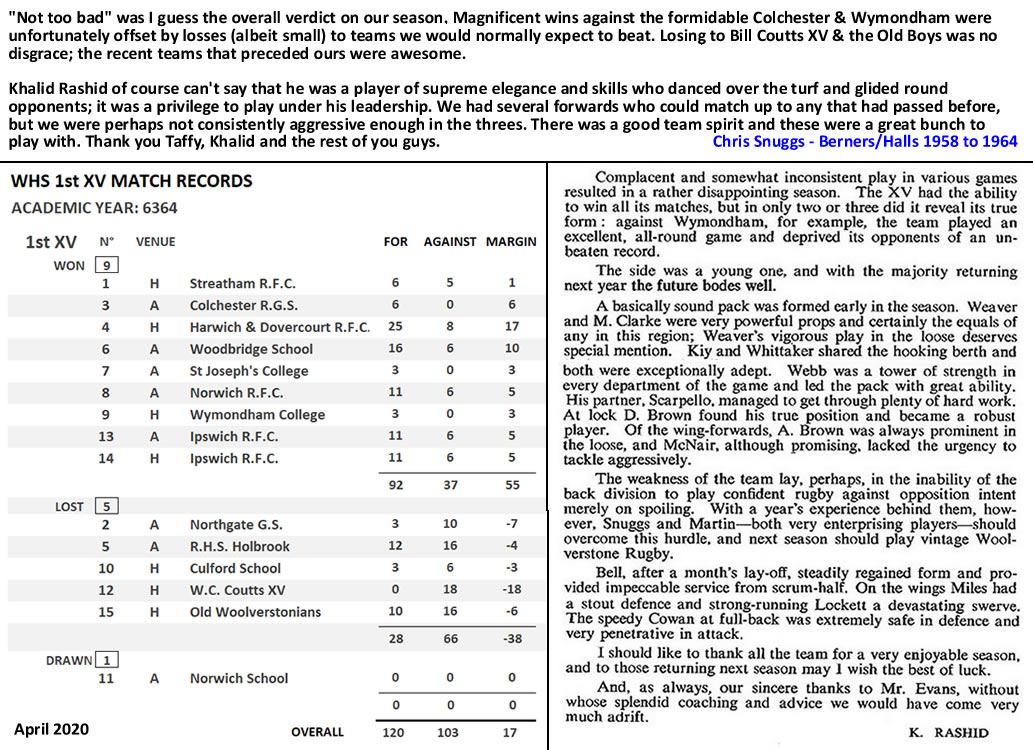Let’s be clear: I’m writing about the Greavesie stuff played mainly with the feet and a ball. There are purists who insist on this being called “soccer”, but of course, the word “purist” has always had the slight whiff of the weirdly obsessive about it. This is actually a very interesting subject for me, who was always interested in words - long before WHS days in fact, even though Derek Thornbery in particular nurtured and refined that interest. After all, words are what mainly differentiate us from other animals, some of which share over 90% of our genes.
Returning to our sheep, I see it as entirely logical that the WHS game be known as rugby and the Greavsie one as football. The fact that Americans call their weird handling game “football” can be ignored. Don’t get me wrong; I love America and probably a majority of Americans, but they are not going to dictate the agenda here. Funnily enough, I have often wondered what they should call their game. It is not - as we have seen - football, but neither is it rugby. Do we know where it was invented? For example, if it were first played at Kalamazoo, we could call it by that name - just as rugby was invented at Rugby School - which is of course fortunate for our game. Imagine if it had been first played at Doncaster! Then it would have been called “donk”. Even worse, it could have first appeared in Snodbury, Didling, Blubberhouses or - God forbid - Droop. Incidentally, it is amusing (you don’t have to agree) to think that if it had been at WHS that, for example, William Blair-Hickman had first picked up a ball and run with it during a game of football then the game would have been called “Woolverstone”, and no doubt at some stage “Woolvo”.
Anyway, that was just to clarify our terminology. The point is this. I assume (I am not a great fan of assumptions, but like idiot politicians, they are hard to avoid) that the absolute vast majority of boys going to WHS had never played rugby but HAD played football. ERGO, rugby was completely new for them but they were used to playing football - and presumably for the most part liking it. And yet, during the standard seven-year incarceration at WHS, football would be off the menu except as an slightly illicit and guilty occupation on Orwell Side well out of Taffy’s sight.
WERE boys disappointed not to be able to play football? I THINK that I knew before I went to WHS that rugby was played there, but I am not sure that I knew that there would be no football at all. That was not a problem for me, but I assume it might have been a big disappointment for some boys.
As for football, I do remember that some of my peers wanted to play it somehow or other, and of course Sunday on Orwell Side was just about the only opportunity. I remember quite clearly talking amongst ourselves and asking “Is it allowed? What if Taffy finds out?” Well, we never knew whether Taffy found out or even cared. In schoolboy legal terms, what we did on Sundays was to a large extent up to us; even at that tender age I remember feeling that even if Taffy objected to ANY manifestation of football on WHS soil he would not legally have a leg to stand on in trying to ban it.
In truth, I have NEVER known what he thought of boys playing the dreaded football on WHS soil. I assume he MUST have known it went on, but I do know that to me at least he never referred to it or took any steps to discourage it. I remember we junior house boys playing impromptu games of football on Orwell Side, but now I think about it I don’t remember seeing any older boys doing likewise. Maybe this was a newbie thing and after a couple of years boys were so into rugby that they no longer bothered with any form of football - on Orwell Side or elsewhere.
As for Orwell Side, I certainly don’t remember playing football there much after my second year, but we did play something called “the kicking game”. This was a non-contact game where we kicked the ball to each other rugby-like up and down the pitch (and touchline) - it was more like practising our rugby kicking skills than a game as such.
So there you have it; football was squeezed out of existence at WHS, where rugby was king. A good number of WHS boys were VERY good at rugby; would they also have made a career in football had they not gone to WHS? Maybe, but it was as it was, and I do not remember any great and lasting regret that we had no official football at WHS. There COULD have been a compromise: playing rugby in the autumn term and football in the spring. Would that have been better? I guess not.
PS I recently used the word “rugger” in connection with the hallowed game and got really told off by “a purist”, who insisted that “rugger” was a bastardardized version of the word and should be banned. I had never thought about this before. I have the impression that we used the word “rugger” at school. Does anyone remember? Did Taffy ever use the word?
PPS Orwell Side - weren't we lucky to be able to wander about and do things there? What a beautiful place to spend a lazy summer afternoon. 
Jon Kemp (73 to 80): Football was played every Sunday morning in the front Garden at Corners. The pitch included the drive and a few trees.
Frederick Townson (52 to 58): In the '50s kicking a round ball often resulted in a detention.
Chris Snuggs (58 to 65): WOW!
Graham Forster (59 to 67): Taffy caught a group of us playing football on Orwell side and confiscated the bal
Roger Friend (58 to 63): I remember walking on the grass being a hanging offence! So was walking on the 6th form path ....
Chris Snuggs: Well, he was out of order, I am sorry to say. Not least because there was no actual RULE that you couldn't play football on Sundays on Orwell Side, was there? Nobody in their right mind would have gone up to Church Field to play football, but OS was a different thing! And Sunday was our day off!! Did you get your ball back?
Graham Forster: I don't know: it wasn't my ball. Taffy hated anyone playing with the round ball.
Chris Snuggs: I kind of knew he hated it, but not that he ever took any action to stop it, yet I was there when you were. Your group must have just been unlucky on the day.
Graham Forster: Maybe Wales had just lost in the 5 Nations????
Chris Snuggs: A pretty rare occurrence in those days ...
Richard Stokes (72 to 79): We had goalposts on Orwell side. We once had a charity match vs Ipswich School. I think Paul Whitmarsh played for Greys Athletic. The score v Ipswich was 0-0.
Chris Snuggs: Goalposts on OS? Unthinkable up to 1965 and probably longer!







